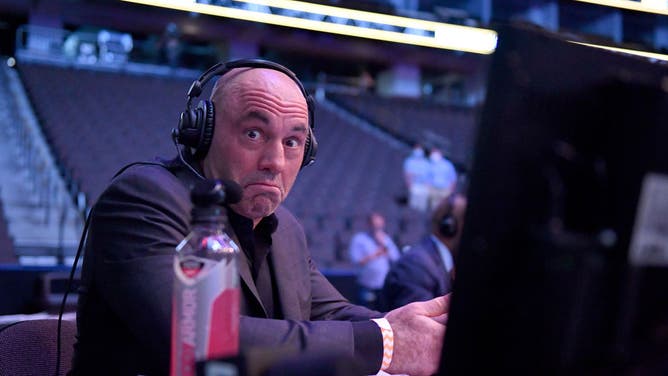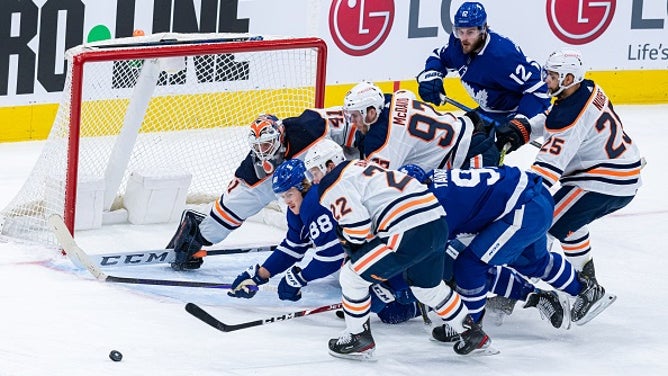Has UFC Surpassed NHL As The 4th Most Popular Sport In US?
MLB, NBA, NFL, and NHL are commonly referred to as the "Big Four" major sports leagues in the United States. Yet Endeavor president Mark Shapiro says the UFC now holds one of those four positions in the hierarchy.
"I’ve spent a lot of time in sports in my career. I’m getting old now. You used to hear it more often than you do now, but it used to be the four majors. The four majors. And frankly, what are you talking about," Shapiro said during an appearance at Morgan Stanley’s Technology, Media & Telecom Conference on Wednesday.
"The UFC is now not only mainstream, it’s one of the four majors."
Per Shapiro, the UFC eclipsed the NHL – bumping professional hockey out of the "Big Four."
"The ratings on ESPN and ESPN 2, apples to apples against the NHL, even including the playoffs, we dwarf them," Shapiro said. "You put a Fight Night — not a pay-per-view, not a preliminary bout in front of the pay-per-view — a regular weekly Fight Night on ESPN does double-digit ratings… and the demos are anywhere between 20-40 percent up."
Shapiro is compromised on said topic. Obviously. Endeavor is the parent company of TKO, which owns the UFC and WWE. However, the former president of ESPN's argument is intriguing. We don't scoff at it.
Let's review the "Big Four" U.S. sports:
The NFL is No. 1. It's not close. The NFL is already the largest sports league in the country and is growing, setting several postseason and Super Bowl viewership records last season.
The NFL is on a tier of its own.
College football is second in popularity. Television networks value SEC and Big 10 football second only to a package of NFL football. That said, Shapiro's wording – "four majors" – suggests he's not factoring college sports into his equation.
Fair.

The NBA and MLB account for the second and third most popular sports leagues in the U.S. But the order is up for interpretation.
The NBA is the more valuable national product. Nationally-televised NBA games average higher ratings than nationally-televised MLB matchups.
However, MLB is more successful at the local level via several regional sports networks. Ryan Glasspiegel contextualized the MLB vs. NBA race in 2019, providing the following details:
"For the full 2019 season, MLB RSN games averaged a 2.86 rating and NBA games averaged a 2.3 rating per game for the 2018-19 season. This means that MLB games rated 24 percent higher than NBA games, before accounting for the fact that a) There are twice as many games in MLB, and b) MLB games last on average about 50 minutes longer, meaning more advertising inventory."
MLB also averages $11.5 billion in annual revenue, compared to the NBA’s average of $10 billion. (The NFL averages $18 billion, the highest mark worldwide.)
All in all, MLB is slightly more popular than the NBA.
That brings us to the fourth spot, rounding out the "Big Four."

TORONTO, ON - MARCH 29: Toronto Maple Leafs Winger William Nylander (88) reaches for the puck in front of Edmonton Oilers Goalie Mike Smith (41) during the NHL regular season game between the Edmonton Oilers and the Toronto Maple Leafs on March 29, 2021, at Scotiabank Arena in Toronto, ON, Canada. (Photo by Julian Avram/Icon Sportswire via Getty Images)
As Shapiro says, the UFC is a hotter television product and drives more subscriptions to ESPN+ than the NHL. That said, contrasting weekly fights versus a barrage of regular-season hockey is nonpareil.
In terms of annual revenue, the NHL holds a substantial $5.93 billion to $1.3 billion advantage over the UFC. Mark Shapiro would say that is about to change.
In fact, he made that case this week:
"Yes, [the UFC] is under-monetized. There’s more money to be made in all the different places we’re making it. But guess what? It’s a growth story. We’re gonna make that money. We’re already making that money. We’ve gone three times on our sponsorship sales. And we’re going to go further in time."
I tend to agree.
The expectation around the sports media industry is that Amazon, Peacock, and Apple will try to wrest the UFC product from ESPN with several substantial offers. ESPN's exclusive partnership to air UFC content expires in 2025.
Plus, the UFC is more culturally relevant than the NHL. UFC fights are frequently among the most searched topics on Google Trends and social media during fight nights.
The UFC speaks to Red America as the only professional sports league that caters to conservatives, embracing president Dana White’s friendship with Donald Trump:
Corporate sponsors understand the UFC’s influence, as well.
Late last year, Bud Light paid the UFC over $100 million to become the official beer of the promotion, trying to make amends with the former Bud Light drinkers who boycotted the company following its partnership with Dylan Mulvaney.
Brands don’t overpay for association with the NHL.
Bud Light sold out to the UFC. Not the inverse.
In the end, Mark Shapiro is not blowing smoke. The UFC's case over the NHL is strong, despite the current disparity in revenue. If you were buying stock, you’d choose the UFC over the NHL. So would most television and streaming platforms.
Thus, if we must choose, and a "Big Five" is not a plausible concession – we’d anoint the UFC to "Big Four" status.